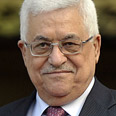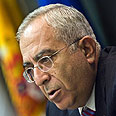
Palestinian President Mahmoud Abbas
Photo: AFP

Palestinian PM Salam Fayyad
Photo: AP
At this time, senior Palestinian figures no longer want the VIP cards issued by Israel to about 300 elected officials and heads of Palestinian security arms. These cards enable them, among other perks, to stay in their air-conditioned Mercedes and quickly pass through IDF roadblocks in the West Bank, while their people watch on angrily and enviously.
These cards have become a symbol of “collaboration,” that is, the good ties between the PA’s security agencies and the Israeli Shin Bet; yet now, these cards are being shunned. Hussein al-Sheikh, the deputy minister for civilian affairs in the Palestinian Authority, publicly announced that he refuses to accept the card, because Israel removed 100 names from the VIP list – all of them members of the Fatah’s central committee who took part in the protests in Bil’in.
Yet they are not only shunning the cards. They are also shunning the economic ties with Israel. Palestinian officials are discussing the gradual elimination of Palestinian work at industrial zones in the settlements, as part of changing the PA’s economic-organizational structure. Monitors go into West Bank stores and confiscate goods made in the settlements.
On the whole, the Abbas-Fayyad duo is attempting to erase the last remnants of the Oslo Accords. For example, they are trying to blur the differences between West Bank areas A, B, and C, which were designated in Oslo. Recently, Fayyad opened agricultural offices in the Jordan Rift Valley and also settled farmers in areas within area C, which is under Israeli control. This was not done secretly, but rather, in public ceremonies, with photos being published in all media outlets.
Meanwhile, they are leveraging every controversial Israeli move – ranging from the killing of three terror suspects in Nablus to the declaration of heritage sites – in order to press the Americans to prevent Israel from engaging in so-called “hot pursuits” within the West Bank.
All these moves, which are part of what is known as “Salam Fayyad’s White Intifada” in the West Bank - are directed at one target date: July 17, 2010; the upcoming local elections in the West Bank.
Israel asleep again
Nobody pays any attention to it in Israel, yet these elections will be the real test of the legitimacy of the Abbas-Fayyad duo. Everything happening at this time in the West Bank is directed at this target – seeing a sweeping Palestinian Authority victory in the elections. For the first time in years, they wish to show this kind of revolution – the return of power to the PLO’s and Fatah’s hands vis-à-vis Hamas, which in the 2005 elections won 70% of votes in the large cities.Abbas and Fayyad are aspiring to win at least 50% of the vote this time around. With such support, they would be able to move on to negotiations with Israel with the legitimacy of the Palestinian public, and not only with the backwind provided by moderate members of the Arab League. This would be a real source of power, not a bogus one. Hamas has already announced that it will not take part in the elections. The PA will go to elections even without it.
Oddly, in Israel today there is a tendency to ignore the elections on the Palestinian side. In 2005 we fell asleep and were stunned when Hamas took over local authorities, and later on, through general elections, took over the majority in the Palestinian parliament. Now too we are keeping our eyes closed. For example, we now have expectations of the indirect negotiations slated to be launched this week between attorney Molcho and Saeb Erekat (who will not sit together in fact – US Envoy Mitchell will be the mediator between them.)
However, before the local elections in the West Bank, nothing will come out of these contacts.
The Palestinians enter these talks in the aims of discussing the core issues, so that they can showcase them in four months, ahead of the elections. Israel views these talks merely as a stage en route to direct talks which will be launched – according to Mitchell’s plan – in four months. Meanwhile, the Americans want to end these talks with at least a declaration on final-status borders.
What we have here are three parallel lines that do not meet; certainly not at this time.
Moreover, the PA cannot show up at the July 17 elections with a record of concessions on the national front. The opposite is true. It has a clear interest in creating a crisis in order to prompt a warm public embrace and reach the elections with an image of national strength, clear of any indication of “collaboration.”















